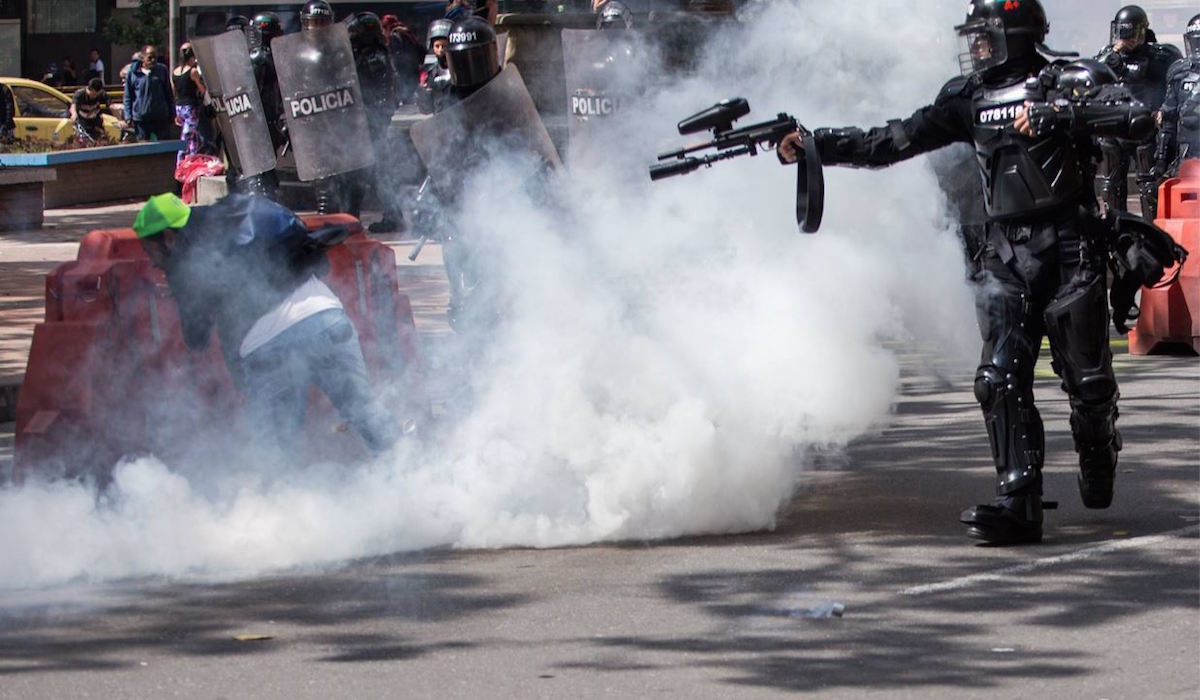The UK Government frequently boasts about its support for human rights in Colombia, and yet as we shall see, its fine words are matched by foul deeds. See https://www.dailymaverick.co.za/article/2021-06-11-revealed-secretive-british-anti-crime-agency-spent-millions-training-colombias-repressive-police/
The Johnson government has expressed some concern about the violent repression of the current National Strike. A letter from the UK Foreign, Commonwealth and Development Office (FCDO) to the Parliamentary Human Rights Group (PHRG) on 27 May 2021 says:
‘We are clear that we support the right of all Colombians to protest peacefully and that the right to peaceful assembly and association must be guaranteed. Colombia is a UK ‘Human Rights Priority Country’ and we have raised our concerns with the relevant state actors in Colombia a number of times over the past two weeks. … Security services must be held accountable for their actions, with all complaints being thoroughly investigated. We will continue to work closely with the UN Verification Mission and the UN Office of the High Representative for Human Rights in Colombia, as well as the wider international community, in support of their efforts to reduce tensions and promote dialogue.’
It also boasts of the training it provides to Colombian police and military, on the grounds that this includes training in how to respect human rights. The same letter to the PHRG says:
‘In your letter, you raised the issue of police training. We support the transformation of the Colombian National Police via the £2.1m CSSF-funded Colombia Peace and Stabilisation Programme launched in 2020. The intervention aims to contribute to the modernization of the police service by scaling up and improving police practices with a preventive approach, focusing on: i) community-based police prevention; ii) transformation of large-scale social conflicts from a rights-based approach; and iii) gender mainstreaming. The project is being implemented through the International Organisation of Migration which will design and deliver activities alongside the Colombian National Police at national and field level, with
strategic support and advice from Police Scotland.’
If the UK Government’s purpose in training police in Colombia is to get them to respect human rights, it is spectacularly ineffective.
We might ask, of course, how a police force with such a shameful history of racism, funded by a government which is itself attempting to pass legislation to forbid and repress protests, is in a position to give human rights training anyway – but even on its own terms, the UK Government’s intervention over a prolonged period must count as a massive failure, give the sheer scale of the fatal brutality currently being meted out by Colombian police.
On top of that, the UK Government continues to allow the sale of equipment to Colombia which could be used (and probably is being used) in the abuse of human rights. The 27 May FCDO letter to the PHRG says:
‘In your letter, you raise the issue of exports and anti-riot equipment. We expect state authorities to comply fully with their human rights obligations, and the UK is committed to protecting and promoting human rights in Colombia. The UK Government rigorously examines each export licence application on a case-by-case basis against the Consolidated EU and National Arms Export Licensing Criteria. Risks around human rights violations or abuses are a key part of our assessment. We do not export equipment and technology where we assess there is a clear risk that it might be used for internal repression.’
Given the nature of the countries to which such exports are sent, including Colombia, UK Government examination of export licence applications must count as a model of irresponsibility.
The National Strike was triggered by a tax reform proposed by the Duque administration which would have favoured multinational capital and the super-rich at the expense of everyone else. Duque was under pressure from international credit rating agencies, who were threatening to remove Colombia’s investment grade rating if he did not carry out such a reform. UK-linked transnationals like mining companies Anglo American, BHP and Glencore, owners of the massive Cerrejón coal mine in La Guajira in the country’s far north, would have benefited from it. The UK Government openly supported it.
Colombia Solidarity Campaign and other organisations in the UK working for human rights and social justice in Colombia have urged the UK Government to take action to rein in financial and extractives companies linked with the City of London. But the government refuses even to encourage, let alone compel, UK-based companies to avoid pressuring the Colombian government over this reform.
It also refuses to direct – or even encourage – UK-linked transnationals to avoid the kind of legal tax avoidance which has led to such a large hole in Colombian government revenues (see https://www.colombiasolidarity.uk/2021/05/the-roots-of-colombias-crisis-2021). Anglo American, BHP and Glencore manage to reduce tax paid in Colombia by Cerrejon Coal by having all its production marketed via CMC in Dublin.
The recent FCDO letter to the PHRG says that the UK Government’s work on security
and justice overseas
‘is based on core British values, including how we promote human rights and democracy. In this regard, the UK is committed to continuing its programming in support of peace, stability and security in Colombia to help implement the peace agreement and build a more peaceful and prosperous society.’
It seems clear that one of the ‘core British values’ on which the UK Government’s work is based is maximising the profits of London-linked transnationals – and maybe the years of training provided to the Colombian military and police have more to do with that than the desire to reduce the open brutality of Colombian state repression of protests.


